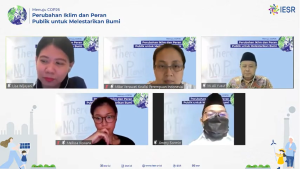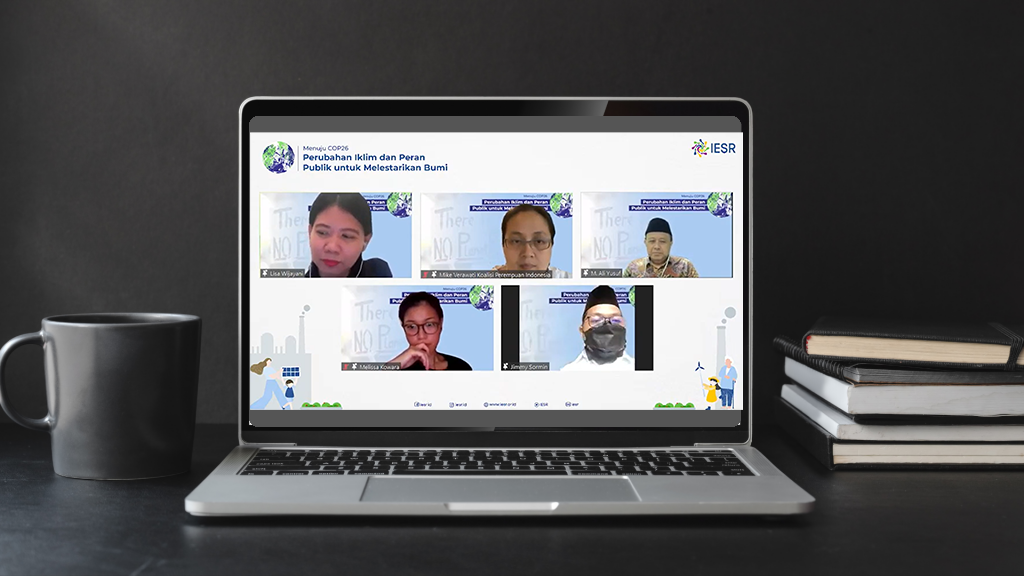Jakarta, 19 October 2021 – Two weeks before the Conference of the Parties (COP) 26 in Glasgow, climate issues are widely discussed in Indonesia, one of which is to raise public voices and provide input to the Indonesian government, which is planned to be attended by President Joko Widodo to increase Indonesia’s climate ambitions.
Indonesia has renewed its climate commitments through the Nationally Determined Contributions (NDC) document which is complemented by the LTS-LCCR (Long Term Strategy – Low Carbon Climate Resilience) document. In terms of numbers, Indonesia did not raise its ambition any further, namely to stay at 29% with its own efforts and 41% with international assistance. Indonesia is also committed to becoming net-zero emissions by 2060 or sooner. Unfortunately, this effort is not enough to bring Indonesia to keep the earth’s average temperature increase of no more than 1.5 degrees Celsius.
In a webinar entitled “Towards COP26: Climate change and the role of the public in preserving the earth”, Fabby Tumiwa, Executive Director of the Institute of Essential Services Reform (IESR) explained that since the 1880s Indonesia has always been included in the top 10 largest emitting countries (Carbon Brief).
“We should see this responsibility to reduce emissions not as a burden but also as an opportunity to carry out a low-carbon economic transformation. The results of the IESR study show that decarbonization in 2050 will actually bring greater economic benefits, because in addition to creating new industrial opportunities and greater employment, Indonesia’s energy prices will be more affordable as well as social and economic benefits that can be felt such as cleaner air and reduce the threat of hydrometeorological disasters due to climate change,” explained Fabby.
Muhamad Ali Yusuf, Chairman of the Nahdlatul Ulama (NU) Disaster Management and Climate Change Institute, explained that in terms of religious-based community organizations communicating the issue of climate change is challenging because the public in general will care about the problems that are in front of their eyes, so we need down to earths and contextual way to talk about climate change in the community.
“On the other hand, our religious discourse is still far from ecological issues such as climate change. Even if it already exists, it has not become a priority issue. So actually literacy on climate change is also necessary for religious leaders,” he explained.

Executive Secretary for Witness and Integrity of Creation, Communion of Indonesian Churches (PGI), Pastor Jimmy Sormin added that religious leaders and figures have a strategic role to influence the views and behavior of the people and have a significant impact on influencing people’s mindsets and perspectives.
“So you must be creative to convey climate change,” explained Pastor Jimmy.
Information on climate change must be disseminated to the wider community without exception, because when the impacts of climate change such as hydrometeorological disasters appear, all residents will be affected.
Mike Verawati, Secretary General, Indonesian Women’s Coalition, explained that women are the ones most affected by climate change because our policies and systems are not inclusive. Citizens’ needs are seen as neutral needs.
“Climate, infrastructure, and nature issues are usually considered as big narratives or masculine issues, so in the end this issue is considered not a women’s issue even though they know the details and are actively advocating, even though sometimes they can’t explain it scientifically,” explained Mike.
Not only women but young people also need to be involved in policy-making efforts to tackle climate change. As the generation that will live in the future, it is these young people who will bear the impact of the climate crisis that is not taken seriously in the future.
“The Indonesian government already has a commitment to reduce emissions, become net-zero by 2060, and overcome the climate crisis. However, this commitment is not enough to overcome this climate crisis, several policy products issued by the government such as the Minerba Law, Food Estate, and the Omnibus Law are counter-productive to efforts to tackle the climate crisis,” explained Melissa Kowara, Extinction Rebellion Indonesia’s Activist.
Melissa also highlighted the lack of literacy about climate change for the wider community. This makes people seem silent or passive because they do not understand the context.

